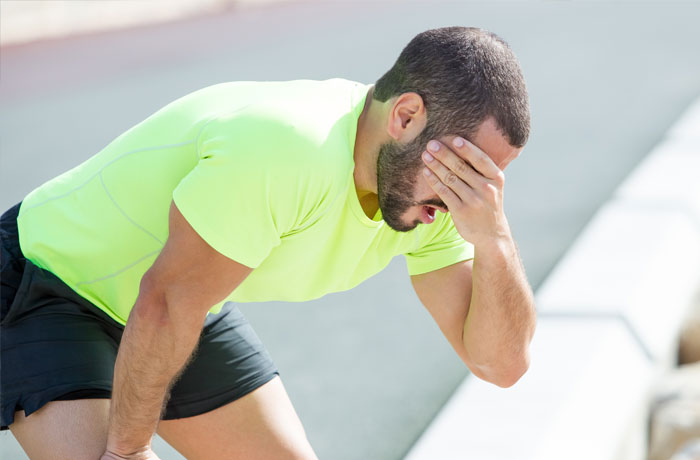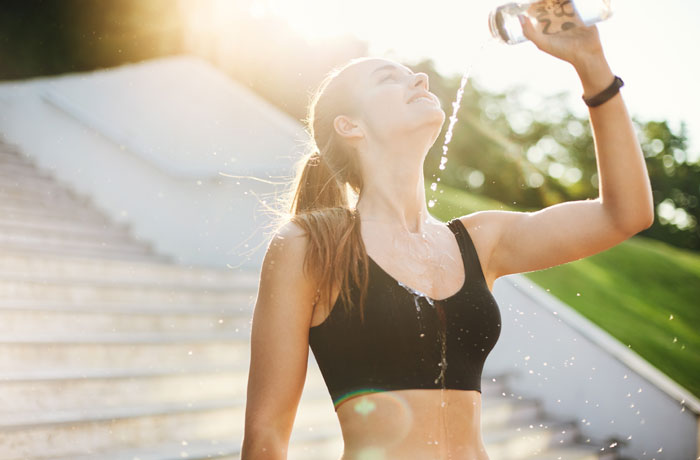Effects of heat while exercising
Heat can be one of the greatest dangers for any athlete, especially if they exercise intensely. In the last few years of the Behobia-San Sebastian race, we have observed a considerable increase in the number of participants when the ambient temperature is above 20 ºC.
| Year | Participants | Registered | % Partic. | Tª | Humidity | Wind | Assistance | % Assis./Partic. |
|---|---|---|---|---|---|---|---|---|
| 2007 | 12.683 | 15.068 | 84 % | 11,2 | N | 82 | 0,65% | |
| 2008 | 13.789 | 16.458 | 84 % | 17,7 | 43 % | S | 158 | 1,15 % |
| 2009 | 14.877 | 18.500 | 80 % | 11 | >70km/h | 71 | 0,48 % | |
| 2010 | 17.437 | 20.809 | 84 % | 13,3 | 76 % | 25 WNW | 85 | 0,49 % |
| 2011 | 19.919 | 23.500 | 85 % | 23,5 | 50 % | 214 | 1,07 % | |
| 2012 | 21.533 | 25.581 | 84 % | 10 | 100 % | 60 | 0,28 % | |
| 2013 | 23.870 | 28.268 | 84 % | 16,1 | 81 % | >60 km/h SW | 140 | 0,59 % |
| 2014 | 26.842 | 30.730 | 87 % | 13 | 154 | 0,57 % | ||
| 2015 | 28.262 | 33.790 | 84 % | 27 | 40 % | 26 Km/h S | 445 | 1,57 % |
| 2016 | 25.228 | 31.276 | 81 % | 13 | 88 % | 25 km/h NW | 120 | 0,48 % |
| 2017 | 25.486 | 30.866 | 83 % | 14 | 85 % | 23 km/h NW | 100 | 0,39 % |
| 2018 | 26.124 | 30.744 | 85 % | 18,5 | 51 % | 30 Km/h SSE | 280 | 1,07 % |
| 2019 | 26.900 | 33.338 | 81 % | 9,5 | 70 % | 35 km/h NNW | 69 | 0,26 % |
| 2021 | 20.438 | 25.381 | 81 % | 14 | 82 % | 25 km/h NNE | 99 | 0,48 % |
| 2022 | 25.700 | 29.732 | 86 % | 22 | 42 % | 18 Km/h N | 337 | 1,31 % |
Effect of heat on the organism
Heat can affect the organism at different levels of severity. If during the race you notice malaise, cramps or dizziness, stop running, ask for help. Do not insist on continuing, this will only worsen the situation. There is a health unit that will come to your aid quickly, but the best measure is prevention. Below is a brief summary of the effects of heat on the organism.
-
Muscle cramps
These are muscle contractures due to excessive loss of water and salts, and an increase in temperature.
They could be the first symptom of a more serious problem. Please stop and ask for help.
-
Heat syncope
This is the loss of consciousness (fainting) that you regain quickly by lying on the ground. On occasions you don't lose consciousness completely, but you notice malaise, dizziness or instability. It means that the loss of liquids or salts is more serious, and the effect of the temperature is greater on the organism. You should cease the activity immediately and ask for help.
-
Heat exhaustion
Incapacity to continue running, together with dizziness, malaise, nausea and vomiting.
You should stop immediately and request medical assistance.
-
Heat stroke
This is the most serious scenario within the possible effects of heat on the organism. There may be cerebral, renal, muscular and liver dysfunction, and this calls for immediate attention to avoid serious injury or even death. During the Behobia race last year, the most serious calls were for Heat Stroke. Heat Stroke is related to the ambient temperature, the degree of humidity and the pace of the race, and not directly with the physical condition of the person, with cardiovascular problems, or with the level of hydration.


Factors influencing heat effect
Our organism has the capacity to eliminate heat from the body. To do so, it has four mechanisms: evaporation of sweat (primarily during exercise), heat irradiation, conduction and convection (the latter two influenced by wearing non-breathable clothing). If the ambient temperature is high, the basic mechanism is sweat, and the capacity to eliminate heat is limited. It is, therefore, important to know the factors that influence the effect of heat:
-
Individual
- Personal propensity
Some people are more susceptible to suffering from heat during exercise. If a person has had similar problems before, they should be studied in depth before doing physical exercise. - Lack of rest
You should not undertake a race like the Behobia-San Sebastian without having slept a minimum of 7 hours the night before. - Concurrent illnesses
Colds, gastroenteritis, etc. Suffering from any of these increases the risk of having a serious problem due to heat if you do physical exercise. - Obesity.
- Little training.
- Lack of acclimatisation.
- Dehydration.
- Personal propensity
-
Environmental
- High ambient temperature.
- High air-humidity.
The organisation will give news of the ambient conditions prior to the start.
A hot humid day is not a day to improve results. Run at a slower pace and avoid unnecessary risks. Do not look at your watch. Avoid overexertion.
Use a heart rate monitor.
-
Taking drugs and/or medication
Taking drugs and/or pharmaceutical drugs may increase the risk of suffering a health problem due to heat.
You should avoid alcohol, amphetamines or other drugs, and if you take diuretics, beta blockers or other cardiovascular drugs do not run in the race.
If you are taking any other drugs, consult beforehand.
Preventive measures
-
Before the race
- Find out about the weather forecast for the day of the race. The organisation will also give this information. If high temperatures are expected, get prepared mentally to maintain a slower pace.
- Rest properly and sleep seven hours minimum the night before the race. Avoid alcohol and other drugs.
- Do not race if you have a cold, gastroenteritis or other illnesses.
-
During the race
- Hydrate adequately (neither too much nor too little, what your body demands) at the stands located for this purpose.
- Do not become obsessed about keeping up a running speed or improving your time. If the temperature is high, this could lead to serious problems. If you notice you are exerting yourself, slow down the pace of the race. A forced rhythm over various kilometres could lead to serious consequences.
- If you notice cramps, dizziness, malaise or headaches, stop and ask for help. There is a health attendance service that will come to your aid quickly. The race will still be there next year.



